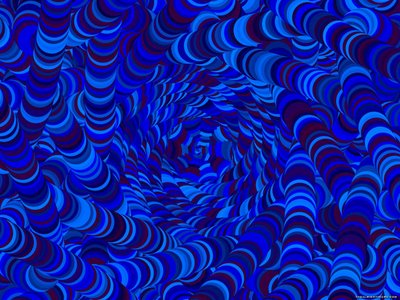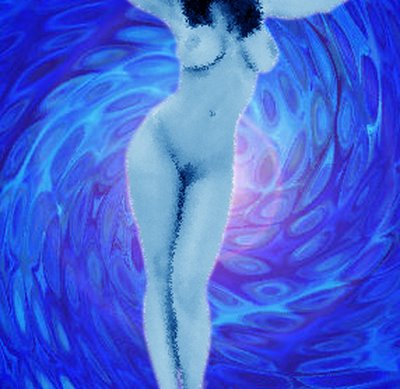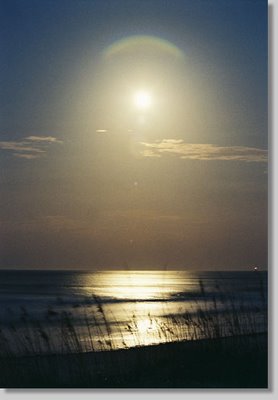Manannan's Wheel

And, if the soul is about to know itself, it must gaze into the soul.
-- Plato, Alcibiades
There is, one knows not what sweet mystery about the sea, whose gently awful stirrings seem to speak of some hidden soul beneath.
-- Herman Melville, Moby Dick
It is out at sea that you are really yourself.
-- Swedish Captain
The sea is masculine, the type of active strength. Look what egg-shells are drifting over it, each one, like ours, filled with men in ecstasies of terror, alternating with cockney conceit, as the sea is rough or smooth. Is this sad-colored circle an eternal cemetary? In our graveyards we scoop a pit, but this aggressive water opens mile-wide pits and chasms, and makes a mouthful of a fleet. To the geologist, the sea is the only firmament; the land is in perpetual flux and change, now blown up like a tumor, now sunk in chasm, the the resitered observations of a few hundred eyes find it in perpetual tilt, rising and falling. The sea keeps its old level; and 'tis no wonder that the history of our race is so recent, if the orar of the ocean is silencing our traditions. A rising of the sea, such as has been observed, say, an inch a century from east to west on the land, will bury all towns, monuments, bones, and knowledge of maknind, steadily and insensibly. If it is capable of these great and secular mischeifs, it is quite as ready at private and local damage; and of this no landsman seems so fearful as the seaman.
-- A queasy Emerson at sea in his essay "Voyage to England"; for him, as, I, the imagined sea is the one to sail. In 1842 he writes in his journal, "Wisdom consists in keeping the soul liquid. There must be the Abyss, Nyx, and Chaos, out of which all things come, and they must never be far off. Cut off the connection between any of your works and this dread origin, and the work is shallow and unsatisfying."
***
That night the north wind had already risen to gale force. I only put my nose outside from time to time to see if there was anything ahead.
How full of meaning and menace is the sound of those two words: Cape Horn! What a vast and terrible cemetary of seamen lies under this eternally boiling sea! Fear adds its chill to that of the atmosphere, the terror that lurks in the name and the sight of those seas.
Here, everything seems to be attracted and drawn towards the depths, as by some monstrous, supernatural magnet. Had I a larger surface of wood under my feet, I could have calmed my nerves by pacing the deck, but no: I could not walk my thoughts under control.
Fear of the storm? No. Apprehension that sprang, I felt, from legend, for all that I had been told about these regions. Of all storms, that which lurks invisible in an atmosphere of terror is the worst.
... As Lehg II neared the grim promontory, through hours made long by impatience and anxiety, I threw my last card on the table of life.
If luck was against me, it would be easy to say:
"It was lunacy to attempt Cape Horn alone, in a 9-tonner -- barely that."
But what if I suceeded?
Imperceptibly, perhapps, the longing of all those who would have liked to make the attempt and were unable to do so, or the hopes of those who had tried without success, crept towards me. Perhaps I had the help of those who perished in this trial; perhaps I was not quite so alone as I thought. Perhaps the seamen of all latitudes were spectators of this struggle against the squalls and the darkness.
-- Vito Dumas rounds Cape Horn in his memoir of circumnaviagating the globe alone in The Roaring Forties

MANANNAN'S WHEEL
July 7
Manannan, or Manachan Mar Lir, is the most distinctive of (the Manx) spirits. It is he who takes the form of the three-legged wheel which is the emblem of Man. He is long-dead, however; no appearance of Manannan has been recorded in living memory.
-- Katherine Briggs, The Fairies in Tradition and Literature
***
St. Columba breaks a chalice and sends a servant to have it repaired. The servant encounter Manannan on his way and the god magically restores the chalice. The god sends the servant back to Columba with question: would he achieve Christian immortality? When the servant shows Columba the healed chalice and submits the god's question, the ungrateful saint replies, "There is no forgiveness for a man who does such works as this!" The servant returns to Manannan with the answer, who broke out into indignant lament. "Woe is me, Manannan mac Lir! For years I've helped the Catholics of Ireland, but I'll do it no more, till they're weak as water. I'll go to the gray waves in the Highlands of Scotland."
***
You haven't been seen
above the tide since
the Christians named
it rude, but that doesn't
mean You're dead: Foam
of wave which lingers
after the ebb is proof
enough You ride
those breakers still.
Their manes are gripped
in Your hands the
way a darkness rides
its depths, fleet
and laughing where
the light of abbeys
built on dry earth
can't enter,
or won't, for fear
of finding the very
devil happy in his
toil. You're there
enthroned amid
a seaweedy wash
of pubic hair,
smiling and
one-eye proud,
booming in Your
baritone a wheeling
brogue composed
of the sea's three legs
of breadth and depth
in endless blue tide.
They raised their
chalice to every bright
and high part
of the day, claiming
there the next life's
judgment and rule.
You lost that battle
in their eyes but
won the greater war,
founding a salt
empire in the
deeper regions of the
heart, that lower,
Sidhe-rich half of
Ireland which sings
and swives and drinks
to dregs the salt
orizons of the soul
while their altars
dry and fall in
certitudes too
heavenly for this
world's good. At the
edges of the known
You are close -- almost --
the pale gleam of
moonlight which ghosts
the icebergs with
ever-noctal fire,
bowering abysms
where narwhals
clatter their horns
like marimbas
and moan long tones
in the tongue of
those darkest
gods who were exiled
there and came to
rule what we banished
from our lands for good.
Oh undaunted demiurge
smiling a deep welcome
which confounds this
well of a whale of a
whorl of a quim of
darkly-diving words!
It's raining now at
4:30 a.m., a steady
soft glissade of
tropic moisture wrung
from low-pressure-
marling skies, making
this morning a drowned
and dowsing, post-coital
wash on shores still
lucent with Your foam.
This effervescent absent
swash will soon enough be gone,
wheeling out and down
that merry sea whose
whirling thrall we are.

ORAN'S VOYAGE TO THE NORTH
It is commonly said that the People of the Sìdhe dwell within the hills, or in the underworld. In some of the isles their home, now, is spoken of as Tir-na-thonn, the Land of the Wave, or Tir-fo-Tuinn, the Land under the Sea.
But from a friend, an Islander of Iona, I have learned many things, and among them, that the Shee no longer dwell within the inland hills, and that though many of them inhabit the lonelier isles of the west, and in particular The Seven Hunters, their Kingdom is in the North.
Some say it is among the pathless mountains of Iceland. But my friend spoke to an Iceland man, and he said he had never seen them. There were Secret People there, but not the Gaelic Sìdhe.
Their Kingdom is in the North, under the Fir-Chlisneach, the Dancing Men, as the Hebrideans call the polar aurora. They are always young there. Their bodies are white as the wild swan, their hair yellow as honey, their eyes blue as ice. Their feet leave no mark on the snow. The women are white as milk, with eyes like sloes, and lips like red rowans. They fight with shadows, and are glad; but the shadows are not shadows to them. The Shee slay great numbers at the full moon, but never hunt on moonless nights, or at the rising of the moon, or when the dew is falling. Their lances are made of reeds that glitter like shafts of ice, and it is ill for a mortal to find one of these lances, for it is tipped with the salt of a wave that no living thing has touched, neither the wailing mew nor the finned sgAdan nor his tribe, nor the narwhal. There are no men of the human clans there, and no shores, and the tides are forbidden.
Long ago one of the monks of Columba sailed there. He sailed for thrice seven days till he lost the rocks of the north; and for thrice thirty days, till Iceland in the south was like a small bluebell in a great grey plain; and for thrice three years among bergs. For the first three years the finned things of the sea brought him food; for the second three years he knew the kindness of the creatures of the air; in the last three years angels fed him. He lived among the Sidhe for three hundred years. When he came back to Iona, he was asked where he had been all that long night since evensong to matins. The monks had sought him everywhere, and at dawn had found him lying in the hollow of the long wave that washes Iona on the north. He laughed at that, and said he had been on the tops of the billows for nine years and three months and twenty-one days, and for three hundred years had lived among a deathless people. He had drunk sweet ale every day, and every day had known love among flowers and green bushes, and at dusk had sung old beautiful forgotten songs, and with star-flame had lit strange fires, and at the full of the moon had gone forth laughing to slay. It was heaven, there, under the Lights of the North. When he was asked how that people might be known, he said that away from there they had a cold, cold hand, a cold, still voice, and cold ice-blue eyes. They had four cities at the four ends of the green diamond that is the world. That in the north was made of earth; that in the east, of air; that in the south, of fire; that in the west, of water. In the middle of the green diamond that is the world is the Glen of Precious Stones. It is in the shape of a heart, and glows like a ruby, though all stones and gems are there. It is there the Sìdhe go to refresh their deathless life.
The holy monks said that this kingdom was certainly Ifurin, the Gaelic Hell. So they put their comrade alive in a grave in the sand, and stamped the sand down upon his head, and sang hymns so that mayhap even yet his soul might be saved, or, at least, that when he went back to that place he might remember other songs than those sung by the milk-white women with eyes like sloes and lips red as rowans. "Tell that honey-mouthed cruel people they are in Hell," said the abbot, and give them my ban and my curse unless they will cease laughing and loving sinfully and slaying with bright lances, and will come out of their secret places and be baptized."
They have not yet come.
This adventurer of the dreaming mind is another Oran, that fabulous Oran of whom the later Columban legends tell. I think that other Orans go out, even yet, to the Country of the Sidhe. But few come again. It must be hard to find that glen at the heart of the green diamond that is the world; but, when found, harder to return by the way one came.
-- From Iona, Fiona McCleod (William Sharp), London: William Heinemann, 1912













